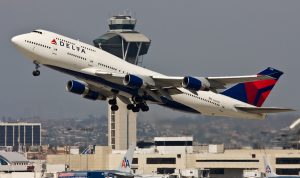 Delta Air Lines Inc. (NYSE:DAL) has announced several cost cutting measures intended to offset the effects of higher fuel prices and increased competition from rivals. While still historically inexpensive, the price of jet fuel has increased 67 percent from a 12-year low on January 20. Delta has said it expects to pay $1.48 to $1.53 a gallon in the current quarter, up from the $1.33 in the first. Delta and other U.S. airlines have also been hurt by the weak euro, which has fallen 17 percent against the dollar in the past two years.
Delta Air Lines Inc. (NYSE:DAL) has announced several cost cutting measures intended to offset the effects of higher fuel prices and increased competition from rivals. While still historically inexpensive, the price of jet fuel has increased 67 percent from a 12-year low on January 20. Delta has said it expects to pay $1.48 to $1.53 a gallon in the current quarter, up from the $1.33 in the first. Delta and other U.S. airlines have also been hurt by the weak euro, which has fallen 17 percent against the dollar in the past two years.
As one cost-cutting measure, Delta plans to cut capacity and fly fewer seats this winter. By scrapping 1 percentage point of its planned growth in the fourth quarter, the company says that flight capacity will rise by less than 2 percent in the second half of 2016, according to a regulatory filing. The company previously planned capacity growth of approximately 3.5 percent for the second half of 2016. Delta is currently the second-largest U.S. airline by traffic.
Delta recently disclosed that corporate passenger volumes are up 2 percent this year, but ticket revenue from corporate travelers has fallen 4 percent. Travel demand from healthcare industry travelers is up 5 percent, but revenue from their tickets is up 2 percent. Business services travel demand is up 3 percent, but revenue from those travelers is down 2 percent. Automotive industry travel demand is up 1 percent but revenue is down 1 percent. Media travel demand is up 5 percent, but revenue is up 1 percent.
Delta also announced that it would defer the 2018 delivery of four large aircraft. By deferring the delivery of four wide-body A350 aircraft from Airbus Group SE to 2019 or later, the airline said it will keep its longer-term expansion in check. The company has 25 A350-900s on order to replace its biggest planes, the Boeing Co 747. Delta said the postponement will better match the delivery schedule to the rate of expected improvements in international markets.
In a separate statement, Delta announced that it would increase its annual dividend to investors by 50 percent, raising the dividend to 81 cents per share. The Atlanta-based carrier also committed to returning at least 70 percent of free cash flow to shareholders, up from 50 percent previously. The announcement sparked a modest rally in airline stock prices, with shares of Delta rising more than 3.3 percent after the news.
